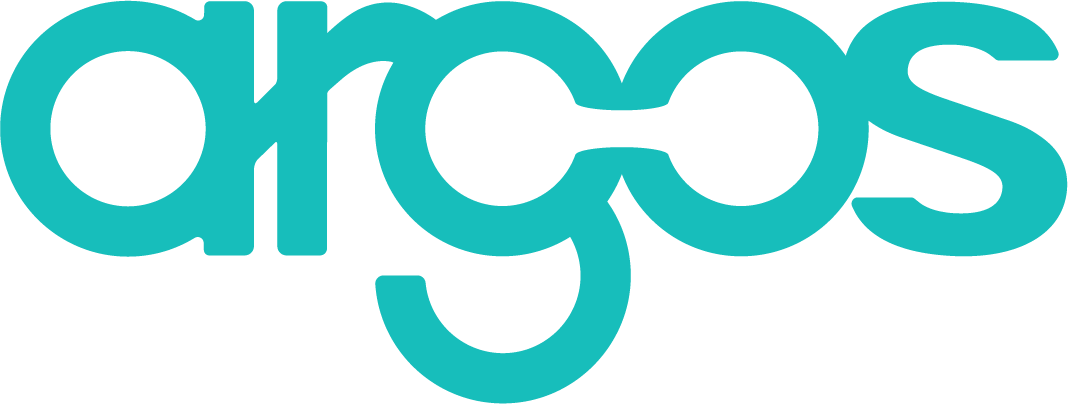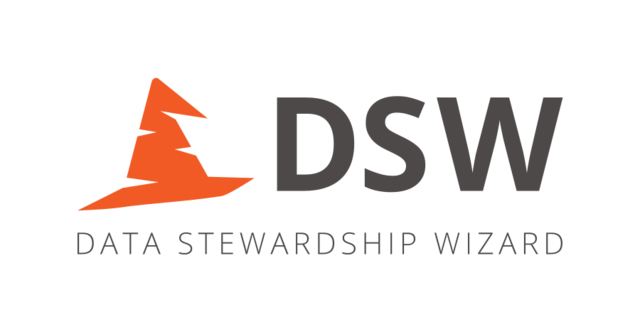OSTrails going global
The last edition of theRDA Plenary Meeting that took place in Costa Rica, found many OSTrails partners in the rainy paths of San Jose while others enjoyed the event online using the Whova app. OSTrails was represented byElli Papadopoulou (ARC), Marek Suchánek (CVUT), Tomasz Miksa (TUWien), Anca Hienola (FMI), Susanna-Assunta Sansone (UOXF), Wim Hugo (Dans/Knaw), Daan Broeder (CLARIN), Tassos Stavropoulos (OpenAIRE).
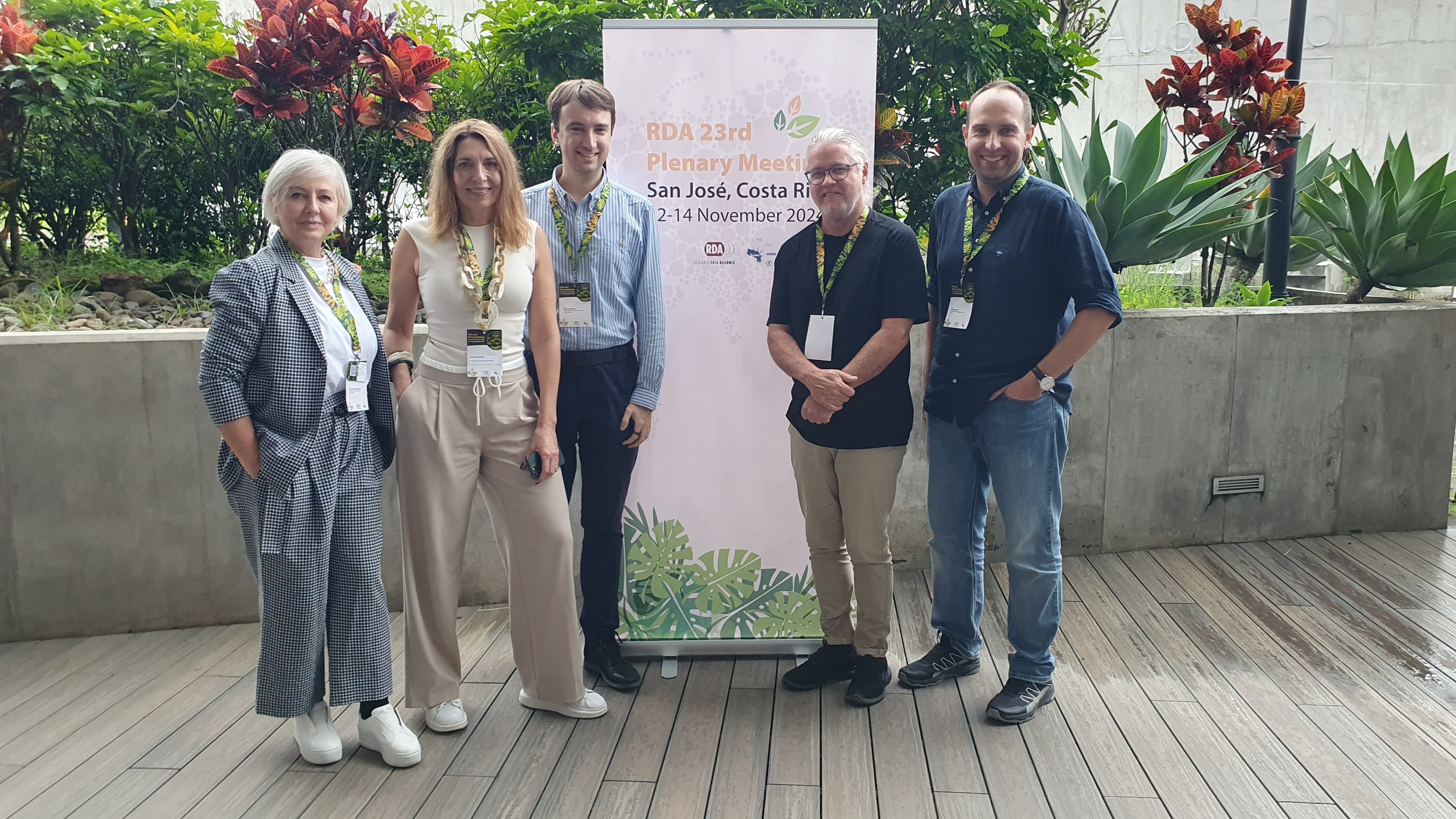 OSTrails Partners Onsite at RDA Plenary.
OSTrails Partners Onsite at RDA Plenary.
In both cases, participation was active in different sessions to communicate the project’s approaches to advancing FAIR principles and interoperability with a focus on enhancing Data Management Plans (DMPs), integrating Persistent Identifiers (PIDs), and fostering a FAIR Digital Object ecosystem. These included topics like ensuring the quality and sustainability of data management, gamifying RDM practices, leveraging tools for curation, and advancing global recommendations for research commons. Specifically, for the latter the dedicated session on DMPs emphasised OSTrails’ commitment to collaborating and aligning practices globally by establishing a common maDMP API and refining interoperability frameworks.
Towards a common API formaDMPs
Co-chairs of theandDMP Common Standardsgroups—Elli Papadopoulou (DC), Tomasz Miksa (TM), and Marek Suchánek (WPL)—ledthe sessionActive Data Management Plans: What are the actions that we need to realize them?”. Rooted in theSalzburg Manifesto,the agenda wascentred onforming new working groups to address API actions and DMP extensions,aligning effortswith initiatives like the European Open Science Cloud (EOSC) andDataCite's DMP_IDs.It presented a draft Case Statement,solicited feedbackto create a12–18-month workplan, and encouraged community engagement to refineobjectives andestablish a comprehensive roadmapformaDMP adoption and interoperability. The session served as a platform topresent preliminary results from theOSTrails project, including the Plan-Track-Assess Pathways and interoperability frameworks outlined inearlyproject deliverables (D1.1: Plan-Track-Assess Pathways,M4_Interim Products Establishment for Cross-Task Collaboration).
OSTrailers were joined by otherRDAcommunity contributorswhoshared their views and activities towards advancingmaDMPs in their regions. Becky Grady from theUniversity of California highlighted enhancements in the DMP Tool that is widely used in theUS, including ongoing developments to makeit fully machine-actionable and integrate API-based functionalities. Elli PapadopouloufromARCpresented theEuropeanperspectivereflected in theOSTrailsPTA framework, emphasising planning, tracking, and assessing data management aligned with FAIRprinciples.Marek SuchánekfromCVUTaddressedmaintenance efforts for the RDA DMP Common Standard, while Tomasz MiksafromTUWienintroducedtheidea for anew working groupthat iscentred aroundastandardised API, aimed at increasingtechnicalinteroperability ofmaDMPs.
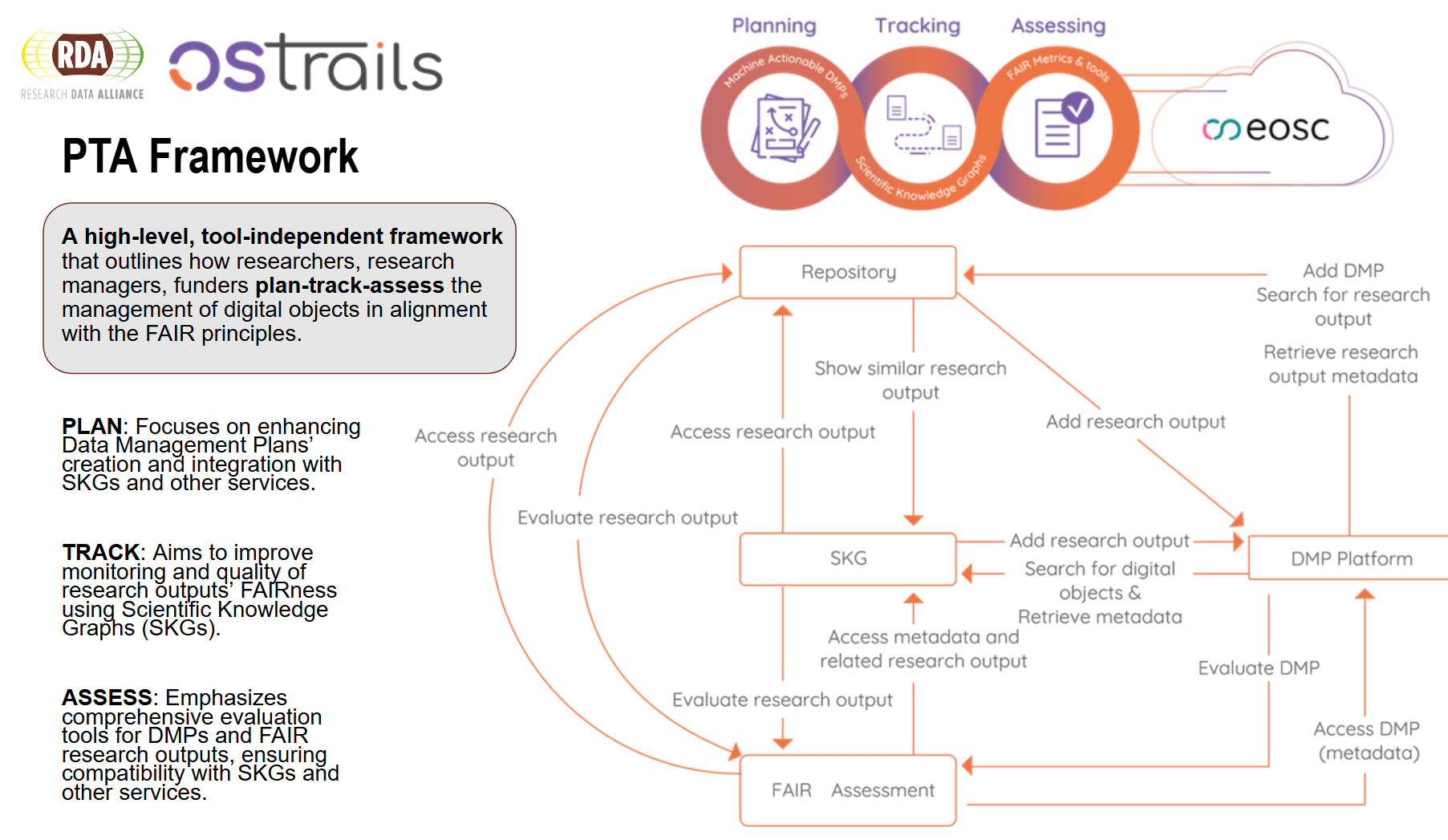 OSTrails PTA Framework.
OSTrails PTA Framework.
Community discussions - Takeaways
Interactive discussions explored thedifferent applications of maDMPs across different settingse.g. research infrastructure vs funding-oriented, including their adoption in tracking research outputs and aligning with evolving metadata standards. Participants stressed theimportance of fostering interoperability among Research Data Management (RDM) tools and services, addressing challenges like balancing technical complexity with usability. The session concluded with concretenext steps, such as submitting a proposal for the new working group, finalising updates to the DMP Common Standard, and encouraging broader community engagement through shared resources and pilots.
Learn more:
The recentmaDMP API Hackathon, held (RDM) more efficient andmachine-actionable. This collaborative event brought together experts withaclearobjective:tostandardise the waythatData ManagementPlanning platformsinteract in an automated way with other RDM services.
Key takeaways from the event
-
The "Common maDMP API - preliminary design" is officially closed following the hackathon, providing a stable foundation for implementation.
-
A common CRUD (Create, Retrieve, Update, Delete) operation was firmly established for each entity within the API.
-
Decisions were made regarding consistent HTTP status codes and error handling.
-
It was agreed that each tool will handle its own authentication and authorisation mechanisms, offering flexibility, though OpenID Connect (OIDC) was recommended for future common ground.
-
DMP versioning will not be supported in the API.
What was the main message?
In this context, the hackathon served as a catalyst for finalising critical design discussions on the topic, leading to a successful outcome: the establishment of a stable, common blueprint for a machine-actionable Data Management Plan (maDMP) API. This API will primarily enable the seamless creation, modification, updating, filtering, and even potential deletion of DMPs, forming the essential baseline for future interoperability of data.
Why is it important for OSTrails?
ForOSTrails, this hackathon is a crucial step towards its mission of delivering the Commons to Plan-Track-Assess research in European Open Science Cloud (EOSC). OSTrails aims to streamline FAIRness, interconnectivity, and machine-actionability across all phases of research. Data Management Plans are a core pillar of the OSTrails project, and a standardised maDMP API is vital for achieving its goal of co-developing and testing fit-for-purpose solutions for FAIRness and machine-actionability across diverse domains and national settings. Building on theOSTrails Reference Architecture, which provides the foundational blueprint for interoperable research tools and ensures alignment across all OSTrails pillars (FAIR, SKG, and DMP), the finalised API directly supports making Data Management Plans more robust and integrated within the broader research ecosystem.
Why is it important for Open Science in general?
This API is important for Open Science because it facilitates the machine-actionability of Data Management Plans, moving them beyond static documents to dynamic, integrable entities. This advancement is key to enhancing the FAIR principles (Findable, Accessible, Interoperable, Reusable) for research data. By standardising how DMPs interact across different tools and platforms, the API fosters greater interoperability within EOSC. This means better governance, tracking, and assessment of research data, ultimately contributing to a more efficient and transparent research landscape globally.
Impressions
The hackathon was characterised by lively discussions and a strong collaborative spirit, especially when tackling complex topics. One of the key outcomes was the successful conclusion of ongoing negotiations around the API design, culminating in the closure of the Common maDMP API - preliminary design document,now considered stable. This outcome reflected a focused and productive working environment, with participants working effectively together to reach consensus on critical technical matters.
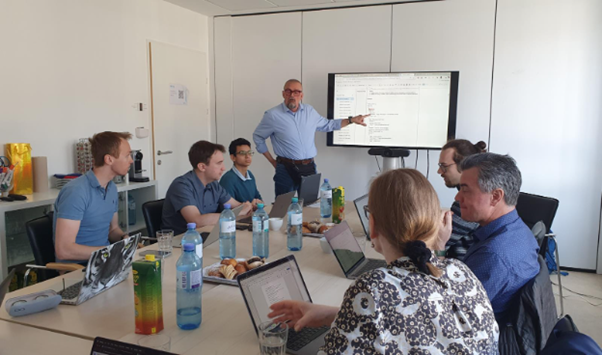
Conclusions
The hackathon marks a major leap forward in making Data Management Plans truly machine-actionable and interoperable. The consensus reached and the finalised preliminary design provide a solid foundation for DMP providers to begin implementing the API. This collaborative effort is essential for building a robust infrastructure that supports researchers, institutions, and funders in creating a cohesive, machine-actionable Open Science ecosystem aligned with FAIR-by-design principles and the broader EOSC vision. The event also underscores the power of community-driven development in addressing complex technical challenges for the benefit of the wider research community.
- Pilots using the tool:
Finnish National Pilot

- Tool Overview:
Open-source data management planning tool hosted by DCC and California Digital Library. DMPTuuli helps to create, review, and share data management plans that meet institutional and funder requirements.
- Tool User Use Cases:
maDMP tool to be assessed in comparison
- Tool generic contact:
This email address is being protected from spambots. You need JavaScript enabled to view it.
- https://www.dmptuuli.fi/
- Pilots using the tool:
German National Pilot (RWTH Aachen)
- Tool Overview:
The Research Data Management Organiser (RDMO) supports research projects in the planning, implementation and administration of all research data management tasks.
- https://rdmorganiser.github.io/en/
 OSTrails Partners Onsite at RDA Plenary.
OSTrails Partners Onsite at RDA Plenary. OSTrails PTA Framework.
OSTrails PTA Framework.
